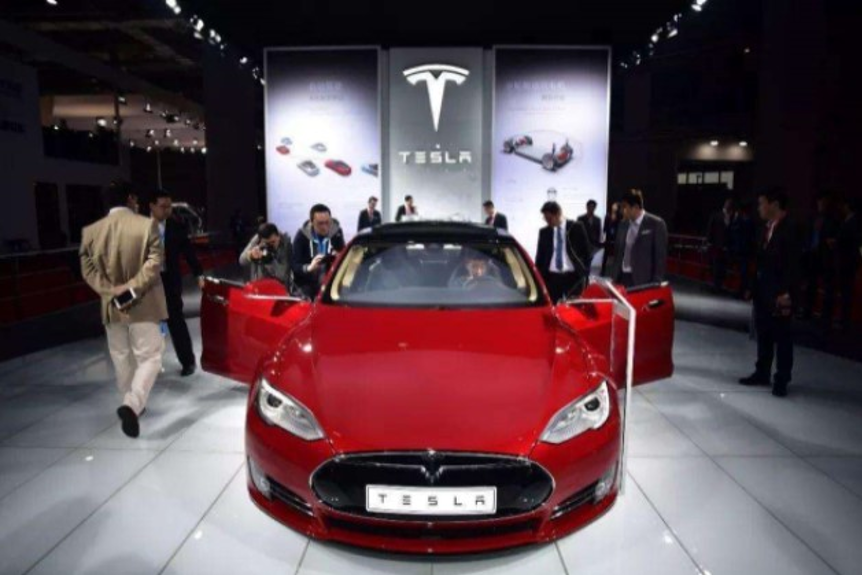Tesla engineered its latest coup on Wednesday, becoming the world’s richest car company while two of Detroit’s old guard – General Motors and Fiat Chrysler – reported sagging auto sales amid the coronavirus pandemic.
Led by Elon Musk, Tesla has seen ups and downs but its shares have risen steadily since late 2019 as it met key production targets for its Model 3 car, with the automaker topping Japan’s Toyota in market valuation.
The company still sells only a fraction of the autos of the Big Three, yet it has captivated investors’ imaginations as a bet on the future under charismatic leader Musk, who has challenged conventional wisdom on CEO comportment while also trying to shift the industry towards electric cars.
The lower sales at two of Detroit’s “Big Three” were largely due to the coronavirus pandemic, which depressed auto demand during the quarter and prompted a nearly two-month shutdown of US auto production.
Both GM and FCA pointed to improving sales trends later in the quarter, although GM also said the recent spike in US coronavirus cases added to uncertainty.
Analysts at Cox Automotive have warned of the possibility of a “cruel summer” for auto sales as the United States contends with a resurgent coronavirus outbreak and car makers struggle to replenish inventories.
“The market is losing the upward momentum that it enjoyed in May and early June,” said Cox Automotive Chief Economist Jonathan Smoke.
“The challenge ahead begins with the increasing number of Covid-19 cases that’s causing consumer sentiment to decline again. It also appears the pent-up demand that gave us a much stronger recovery in May and June is waning. Dealer inventory remains challenged as well.
“When you add it up, it looks like the industry will be heading into an even more challenging sales environment in July.”
Demand up or down?
At GM, sales plunged 34% in the second quarter from the year-ago period to 492,484 vehicles, the company said. The auto giant, along with Ford and FCA, halted manufacturing for nearly two months at the height of the virus outbreak, but has returned to normal operating levels at most plants.
The company’s press statement alluded to “very lean” inventories of popular pickup and sport utility vehicles, where demand has been solid and increased notably in May and June.
“After falling into a deep recession in March, the US economy has begun to recover as it reopens,” said GM Chief Economist Elaine Buckberg.
“Auto sales are benefiting from historically low interest rates that make now an attractive time to buy a vehicle for many customers. We expect continued sales recovery as businesses ramp back up, but recognise that the path forward may not be linear.”
FCA reported a similar trend, with sales bottoming out in April and bouncing back more strongly than expected in May and June. The company reported a 39% decline during the quarter to 367,086 transactions.
Others reporting big US second-quarter sales drops included Honda, which suffered a 27.9% fall to 293,502 and Nissan, which saw sales plunge 49.5% to 177,328.
Ford is scheduled to report sales on Thursday.
Cox has estimated that US auto sales fell around 30% during the quarter to 4.4 million vehicles. This includes an expected drop of 61% in Tesla US sales to 10,000.
Tesla shares gained 3.7% to finish at $1,119.63, while GM shed 1.3% to $24.96 and FCA fell 3.3% to $9.90.
Other upstarts gain
Conventional automakers have ramped up their online sales to include features such as delivering a car to consumers.
This has also proven a fertile space for Carvana and Vroom, which have risen in market value during this year’s turbulence.
A note Wednesday from DataTrek research said the gains by the e-commerce used car companies show how investors are rethinking valuation in the wake of the pandemic and the rising importance of Amazon, Netflix and other tech companies.
“We’re not saying online used car dealers are a good investment (cool idea, ferociously tough business) but the fact that the stocks have done so well shows equity investors are thinking much more broadly about what sorts of products will sell online,” DataTrek said.
“And as we’ve seen with Tesla, sometimes ‘right idea’ can trump fundamentals for far longer than one might think.”
AFP
























